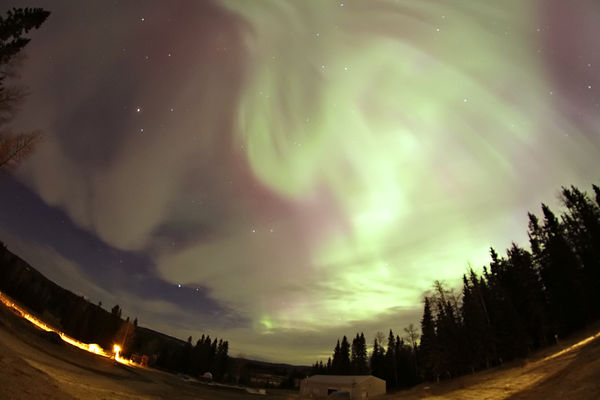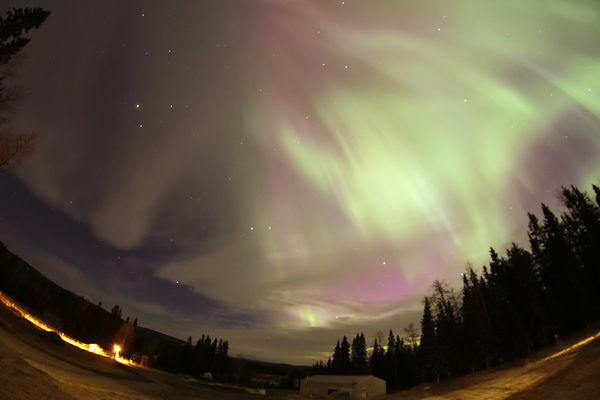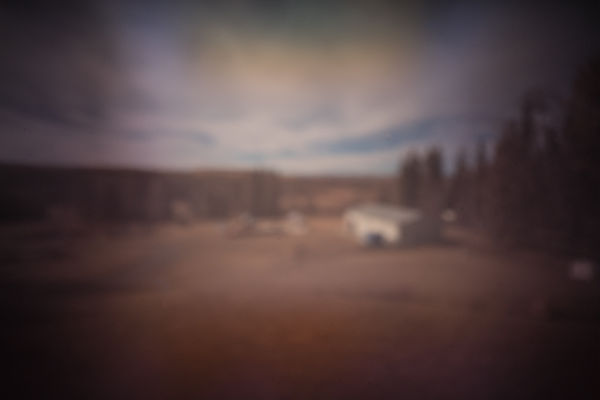Posts for: bwana
Mar 24, 2015 13:54:58 #
Thanks for the post. Quite spectacular!
We get Auroras quite often over our ranch in central Alberta but not quite as colorful as those in Alaska, short video at:
https://plus.google.com/photos/116260312230579398213/albums/5526561973500317537/5944174994818990978?pid=5944174994818990978&oid=116260312230579398213
A couple of still attached from April 2012; one of the best displays we've seen.
Enjoy!
bwa
We get Auroras quite often over our ranch in central Alberta but not quite as colorful as those in Alaska, short video at:
https://plus.google.com/photos/116260312230579398213/albums/5526561973500317537/5944174994818990978?pid=5944174994818990978&oid=116260312230579398213
A couple of still attached from April 2012; one of the best displays we've seen.
Enjoy!
bwa
Aurora Borealis2 - 2012April23

Aurora Borealis1 - 2012April23

Mar 24, 2015 13:21:27 #
I'm quite happy with Photoshop CS4 and simply use the latest version of Lightroom to load and convert RAW files... Works just fine!
Mar 14, 2015 15:40:24 #
Peterff wrote:
I think we were having fun at the beginning of this thread, I think we were having fun in the middle of it, and I suspect most of us are having fun now.
Did anything change or happen? Did we miss something?
Did anything change or happen? Did we miss something?
I do think we've pretty much beaten this subject to death (for now)! But it has been killed in the past and will very likely come back from the dead in the future...
Mar 14, 2015 01:39:53 #
TheDman wrote:
It's hard to write that much stuff and have 100% of it be wrong, but you've managed to pull it off.
+1
Mar 13, 2015 23:15:43 #
RWR wrote:
You're reading my mind! As soon as I made the comment I changed the setting to lossless compressed. No idea why I hadn't done that long ago (only had the camera for 10 months!). Should have mentioned, too, that I save as 16 bit TIFFs, & convert to JPEG for email or uploading.
A win, win decision! Smaller files and still lossless :)
bwa
Mar 13, 2015 21:31:17 #
jenny wrote:
* * * br In other words, your camera's factory de... (show quote)
Right off the bat you've lost dynamic range using an 8 bit JPG file... Even if you want to assume JPG artifacts don't have an impact on your pictures.
Just saying...
Mar 13, 2015 17:51:24 #
R.G. wrote:
...
I wouldn't want to save an edited jpg image too often as a jpg, but it's impressive how often a jpg SOOC can be re-saved as a jpg before the deterioration becomes prohibitively bad. But why do it when there are better alternatives. Mass storage isn't prohibitively expensive any more, so lots of MBs aren't a problem for most of us.
...
I wouldn't want to save an edited jpg image too often as a jpg, but it's impressive how often a jpg SOOC can be re-saved as a jpg before the deterioration becomes prohibitively bad. But why do it when there are better alternatives. Mass storage isn't prohibitively expensive any more, so lots of MBs aren't a problem for most of us.
Yes, why tempt fate...
If you must start from JPG files, at least save them in a lossless format and retain them in this format throughout the editing process. You might consider saving them as TIF or PNG, per:
"Portable Network Graphics (PNG) is a raster graphics file format that supports lossless data compression. PNG is the most used lossless image compression format on the Internet."
bwa
Mar 13, 2015 16:17:43 #
R.G. wrote:
If I didn't have my own and many others' first-han... (show quote)
Another thing to consider is bit depth. JPG is a maximum of 8 bits. Most RAW files are at least 12 bits or higher. More bits are better!!
Mar 13, 2015 16:10:46 #
Thanks for the very interesting link.
My wife and I will be touring Norway this May and cruising from Norway to Iceland. Great background info.
My wife and I will be touring Norway this May and cruising from Norway to Iceland. Great background info.
Mar 13, 2015 14:43:43 #
dmeyer2m wrote:
... What is actually happening to the pixels in the image that grew in file size?
Your question piqued my interest in this, so I loaded a JPG image into Lightroom and saved it, loaded the new one and saved it... repeated six times. Each JPG image was slightly larger than the next; 1374, 1377, 1379, 1382, 1386 & 1389 KB. I then loaded the 1st and last images into Photoshop as layers and did a Difference. The difference is barely noticeable but there IS a difference between the two images.
It has been explained to me as:
"A JPG image retains just enough information to represent an image to the level of quality requested. The remaining information is either discarded or added to the image as "artifacts". As a JPG image is reloaded and saved, the artifacts from the previous save may be considered valid image data and retained, and new artifacts added. Over many iterations of loading and saving, artifacts accumulate increasing the file size. This is one of the reasons it is not recommended to do multiple revisions on JPG images."
I also reran my analysis six times saving the JPG's at 50% quality. The image quality went down considerably, the artifacts increased significantly and each file was slightly smaller than the previous. I would assume if I carried this far enough I would have a fairly small file containing nothing but artifacts and next to no image data?
I'll stick with editing lossless image files...
bwa
Mar 9, 2015 22:24:59 #
Thanks for the link. I've been looking at this lens to go with an A7 II camera.
bwa
bwa
Mar 9, 2015 00:26:52 #
JPL wrote:
I have some adapters, but wish there were more available!
Which one is missing?
bwa
Mar 7, 2015 15:24:20 #
Bram boy wrote:
sense
Now, now, don't knock pin hole cameras. They have their place. :)
Sorry about the focus
bwa
Yard w/ Pin Hole Lens

Mar 7, 2015 13:38:47 #
gee4time wrote:
Sorry I asked. I was hoping for some intelligent conversation.
Probably about as intelligent as it gets on this subject which will be debated for eternity.
I've seen great pix off a 2 MPixel camera and terrible ones off everything else. I guess the short answer is "no".
bwa
Mar 6, 2015 21:33:47 #
SharpShooter wrote:
bwa, first, make no mistake, that this was in no w... (show quote)
A mirrorless camera's sensor is simply exposed to the elements most of the time and not hidden behind a closed shutter (and mirror) as it is in a DSLR. Also, most camera manufacturers recommend turning off a camera before changing lenses to reduce dust problems, per Nikon USA's recommendations:
http://www.nikonusa.com/en/Learn-And-Explore/Article/g7jz8rrr/getting-started-how-to-change-a-d-slr-lens.html and their comment:
"... make sure you turn the camera's power off before changing the lens as the image sensor itself generates a static electric charge that can attract dust." Canon and Sony state much the same thing and I know from personal experience I get a whole lot more dust stuck to the sensor if I change lenses with the power on.
I don't suspect changing lenses will "electrocuting it (the camera) till dead". At least all my cameras are still running after changing lens, batteries & memory cards without first turning off the power.
bwa